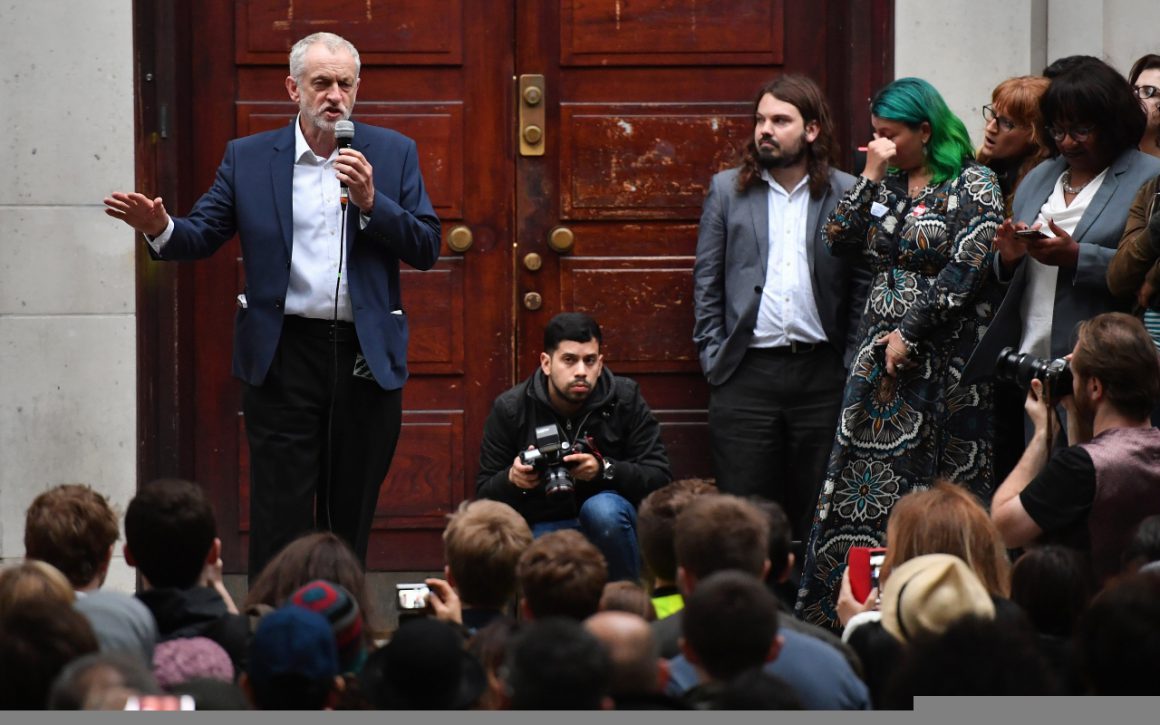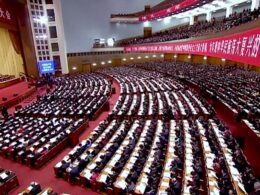Article from “The Socialist”, paper of the Socialist Party in England and Wales, on how the attempts to remove Jeremy Corbyn by the Blairite clique in the Parliamentary Labour Party should be fought:
Four thousand in Liverpool, 1,000 in Manchester, 800 in Leeds, thousands in London. Across the country people have taken to the streets to show their support for Jeremy Corbyn and their anger with the 172 traitor MPs who are waging a war to try to force Jeremy Corbyn to resign. No matter to them that he was democratically elected leader by a landslide just nine months ago; they are determined to get rid of him by any means necessary. The vote of no confidence has been followed by Chuka Ummuna MP and others using a parliamentary select committee to smear Corbyn with false charges of anti-Semitism.
There have been open calls by several Blairites, including by author Robert Harris in the Tory Times, to “join Labour now to topple Corbyn”. Despite their efforts, however, the majority of the 60,000 who are reported to have joined the Labour Party in just one week have done so in order to try and stop the coup, not to back it. As we have commented previously, the problem for the Labour right is their lack of a social base – what is their rallying cry, ‘say no to free education, don’t build council housing, bomb more countries’?
Instead they are reduced to claiming, with no evidence, that a more right-wing leader would be more likely to win a general election. In reality, however, it is not because Jeremy Corbyn is unelectable but because they fear he could win a general election. Blair himself said that Jeremy Corbyn as prime minister would “be a very dangerous experiment”; an experiment his acolytes are determined to prevent.
Jeremy Corbyn was thrust into power by an uprising against austerity. If he was to win a general election the 1% are terrified that the hopes of millions of working class people would be raised and, as a result, that government would be pressurised to take radical measures which would threaten their system and gargantuan profits. That is the fundamental reason why the Blairites, the representatives of the 1% in the Labour Party, are determined to remove Corbyn no matter what the costs. In addition they hoped to get him out the way before the publication of the long-delayed Chilcot Report, which will further damage not only Blair, but all those Labour MPs – including leadership contender Angela Eagle – who backed the war in Iraq.
Now that war has been declared by the Parliamentary Labour Party, the worst possible response would be to capitulate. It is much to Jeremy Corbyn’s credit that he has so far stood firm. Len McCluskey, general secretary of Unite, the biggest affiliated union, has made welcome clear statements of support for Corbyn. But he has then gone on to suggest that the trade unions could broker a deal that breaches the chasm between Corbyn and his supporters and the 172 MPs trying to knife him. However, there is no principled compromise possible with MPs that shown they are prepared to split the Labour Party in order to oust Corbyn.
Over the last nine months attempts to compromise with the right have resulted in a number of retreats, including not calling for deselection of Blairite MPs and refusing to make a clear call for Labour councils to stop carrying out cuts in public services. The attempt to compromise with the right also led to Momentum – the organisation set up to support Corbyn – excluding the Socialist Party and others.
But it is now clear that the strategy of compromise cannot work. Instead it is necessary to stand firm and to build on the popular movement which thrust Jeremy Corbyn into the Labour leadership and is now coming out on the streets to defend him. What is needed is an urgent labour movement conference, which should be convened now, involving all those who support Corbyn: the trade unions (affiliated and unaffiliated), Labour Party branches and all left and socialist organisations inside and outside the Labour Party.
The right have already made clear that if they cannot defeat Jeremy Corbyn they are considering splitting away. They have been weighing up this option from the day Jeremy Corbyn was elected. In September it was already reported in the Sunday Times that: “Backers were prepared to put up millions of pounds for the new party, provisionally called the Progressive Democrats, which would have left the Labour Party behind with its debts.” For the Blairites’ big business backers such a right-wing split, like the SDP in the early 1980s, is another cynical attempt to try and prevent a left Labour government being elected.
Many Labour supporters will fear that such a scenario would weaken the Labour Party. In fact the opposite would be the case. True a Blairite split away would – at least initially – dramatically decrease the number of Labour MPs in Westminster, but a group of 40, or even 20 or 30, MPs who consistently campaigned against austerity and defended workers in struggle, would do far more to strengthen the fightback against the Tories than 232 ‘Labour’ MPs, a majority who vote for austerity, privatisation and war. A re-founded anti-austerity Labour Party could quickly make electoral gains, as has demonstrated by the 2015 election of Syriza in Greece, initially on an anti-austerity platform, and the growth in support for the left in Spain.
Such a refounded Labour Party would need an open, democratic federal structure, along the lines of the Labour Party’s structure in its earliest days, allowing the participation of all anti-austerity forces, including the Socialist Party, anti-austerity Greens and others. It would need to launch a fight against austerity, with the programme which Jeremy Corbyn stood for Labour leader on as its starting point. This should include making clear that he opposes austerity whoever it is implemented by: Brussels, Westminster or local councils.
Such a stand – including a £10 an hour minimum wage, nationalisation or the rail and energy companies, and mass council housebuilding – would be able to enthuse millions, including many of those who showed their anger at the existing order by voting for exit in the EU referendum. In essence it would mean the formation of a new radical workers’ party, able to attract all those workers and youth wanting to fight back against capitalism.











